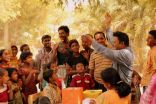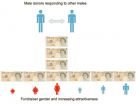(Press-News.org) April 16, 2015, NEW HAVEN, CT - With poor sanitation estimated to cause 280,000 deaths per year worldwide, improving sanitation is a key policy goal in many developing countries. Yet governments and major development institutions disagree over how to address the problem. A new study released in Science today found that in Bangladesh, a community-motivation model that has been used in over 60 countries to increase use of hygienic latrines had no effect, yet latrine coverage expands substantially when that model is combined with subsidies for hygienic latrines targeted to the poor.
The study, led by Raymond Guiteras of University of Maryland and James Levinsohn and Mushfiq Mobarak of Yale University, and implemented by Innovations for Poverty Action, tested three different approaches that are commonly used in the development sector for increasing the use of hygienic latrines. Reducing open defection, which is still practiced by 15 percent of the world's population, is a key policy goal for this sector. The study took place in northwest Bangladesh, in an area where 50 percent of the population had access to a hygienic latrine before the study began.
"While there is general agreement among development professionals and institutions about the importance of improving access to hygienic latrines, there is still vigorous debate about the most cost-effective ways to achieve this." said Mobarak. "Is the problem a lack of cash, or is the problem an absence of strong community norms against open defection? Even when households are willing to pay for hygienic latrines, does lack of access to toilet components or lack of information about quality or installation methods impede adoption?"
Researchers randomly assigned 380 neighborhood communities, or 18,254 households total, to one of four groups. Villages either received a community motivation program, subsidy vouchers with the community motivation program, information and technical support, or none of the above. By comparing outcomes in latrine coverage, investment in hygienic latrines, and open defecation between the groups over time, researchers were able to compare the effect of the different approaches.
The subsidy vouchers, which were only provided to a random subset of households in the second group through a public lottery, could be redeemed for a 75 percent discount on available models of latrines, priced (after subsidy) from $5 to $12. The households were responsible for their own transportation and installation costs, and the richest 25 percent of households were not eligible for vouchers.
The community motivation program, called the Latrine Promotion Program (LPP), was modeled after "Community-Led Total Sanitation", which focuses on behavioral change and community mobilization in eliminating open defection. Such programs have been implemented in over 60 countries worldwide.
Researchers found that the community motivation model alone did not significantly increase adoption of hygienic latrines or reduce open defection relative to the comparison group, nor did providing information and technical support to community members.
However, the subsidy had substantial effects when coupled with the community motivation program, increasing hygienic latrine coverage by 22 percentage points among subsidized households and 8.5 percentage points among their unsubsidized neighbors.
This suggests that latrine investment decisions are inter-linked across neighbors, and that there are positive effects on others of subsidizing even a few households. People were more likely to invest if more of their neighbors received vouchers, pointing to a virtuous cycle where adoption of improved latrines spurs further adoption.
Adding subsidies to the community motivation model also reduced open defection rates by 22 percent among adults in villages that received subsidies (including households that did not receive subsidies), relative to the comparison group.
These results counter the concern among many development practitioners that subsidies undermine intrinsic motivation. Rather, this research shows price is a primary barrier, which is consistent with a growing body of research on adoption of health products.
"These results have particularly important implications in densely populated developing countries, such as India and Bangladesh, where sanitation coverage is low and the public health consequences are high," said Annie Duflo, Executive Director of Innovations for Poverty Action. "The study also teaches us about how to conduct 'smart subsidy' policy, allocating subsidies in a way that maximizes the chances of behavioral changes among neighbors. Given how widespread the community motivation model is, the results of this study can help the sector allocate funds more efficiently," Duflo said.
INFORMATION:
Contacts:
Heidi McAnnally-Linz, Innovations for Poverty Action, 203-974-2976, hlinz@poverty-action.org
Sophie Beauvais, The Abdul Latif Jameel Poverty Action Lab (J-PAL), 617-324-4498, sbeauvai@mit.edu
Innovations for Poverty Action (IPA) is a research and policy non-profit that discovers and promotes effective solutions to global poverty problems. IPA brings together researchers and decision-makers to design, rigorously evaluate, and refine these solutions and their applications, ensuring that the evidence created is used to improve opportunities for the world's poor. http://www.poverty-action.org
The Abdul Latif Jameel Poverty Action Lab (J-PAL) was established in 2003 as a research center at MIT's Department of Economics. Since then, it has built a global network of 117 affiliated professors and regional offices in Africa, Europe, North America, South Asia, South East Asia, and Latin America and the Caribbean. J-PAL's mission is to reduce poverty by ensuring that policy is informed by scientific evidence. It does this by working with governments, non-profits, foundations and other development organizations to conduct rigorous impact evaluations in the field, policy outreach to widely disseminate the lessons from research, and building the capacity of practitioners to generate and use evidence. Over 200 million people have been reached by the scale-up of programs evaluated by J-PAL and found to be effective. http://www.povertyactionlab.org
Astronomers from Chalmers University of Technology have used the giant telescope Alma to reveal an extremely powerful magnetic field very close to a supermassive black hole in a distant galaxy. The results appear in the 17 April 2015 issue of the journal Science.
A team of five astronomers from Chalmers University of Technology have revealed an extremely powerful magnetic field, beyond anything previously detected in the core of a galaxy, very close to the event horizon of a supermassive black hole. This new observation helps astronomers to understand the structure and ...
Astronomers have shown for the first time how star formation in "dead" galaxies sputtered out billions of years ago. The NASA/ESA Hubble Space Telescope and ESO's Very Large Telescope (VLT) have revealed that three billion years after the Big Bang, these galaxies still made stars on their outskirts, but no longer in their interiors. The quenching of star formation seems to have started in the cores of the galaxies and then spread to the outer parts. The results will be published in the 17 April 2015 issue of the journal Science.
A major astrophysical mystery has centred ...
"The answers to extinction, survival and evolution are right here in the dirt," says University of Cincinnati Quaternary science researcher Ken Tankersley, associate professor of anthropology and geology. "And we are continually surprised by what we find."
While many scientists focus on species' extinction wherever there has been rapid and profound climate change, Tankersley looks closely at why certain species survived.
For many years he has invited students and faculty from archeology and geology, and representatives from the Cincinnati Museum Center and Kentucky ...
Washington, DC--Drinking sugar-sweetened beverages can suppress the hormone cortisol and stress responses in the brain, but diet beverages sweetened with aspartame do not have the same effect, according to a new study published in the Endocrine Society's Journal of Clinical Endocrinology & Metabolism.
"This is the first evidence that high sugar - but not aspartame - consumption may relieve stress in humans," said one of the study's authors, Kevin D. Laugero, PhD, of the University of California, Davis, and the U.S. Department of Agriculture's Agricultural Research Service. ...
Washington, DC--People who have osteoporosis face a 1.76-fold higher risk of developing sudden deafness than those who do not have the bone disease, according to a new study published in the Endocrine Society's Journal of Clinical Endocrinology & Metabolism.
Osteoporosis is a progressive condition in which bones become structurally weak and are more likely to fracture or break, according to the Hormone Health Network. More than 40 million people nationwide already have osteoporosis or are at risk of developing the condition due to low bone mass, according to the National ...
This news release is available in French. Quebec City, April 16, 2015--An international study led by researchers from Université Laval and CHU de Québec-Université Laval has identified significant vascular changes in the brains of people with Huntington's disease. This breakthrough, the details of which are published in the most recent issue of Annals of Neurology, will have significant implications for our understanding of the disease and could open the door to new therapeutic targets for treating this fatal neurodegenerative condition.
Huntington's ...
If you are looking to raise money online for your favorite cause, listen up. A real-world analysis of human behavior reported in the Cell Press journal Current Biology on April 16 shows that men treat online giving as a competitive enterprise. Men will donate four times more money to an attractive female fundraiser in response to the contribution of another male.
Researchers say that they suspect this tendency is a subconscious part of human psychology that exists because it is (or was) evolutionarily beneficial to us.
"People are really generous and are right, a lot ...
The body plan of octopuses is nothing if not unique, with a sophisticated brain in a soft, bilaterally symmetrical body, encircled by eight radially symmetrical and incredibly flexible arms. Now, researchers reporting the first detailed kinematic analysis of octopus arm coordination in crawling show that the animals have a unique motor control strategy to match their "odd" form. The researchers report their findings in the Cell Press journal Current Biology on April 16.
"Octopuses use unique locomotion strategies that are different from those found in other animals," ...
Bacteria that naturally reside in the gut are important for health, but recent studies consistently show that a modern lifestyle depletes the gut's collection of microbes. How lifestyle affects the diversity of this gut "microbiome" is unclear, but an analysis of the gut microbiomes of Papua New Guinean and US residents in Cell Reports now suggests that western lifestyle may diminish the variety of bacteria in the gastrointestinal tract by limiting their ability to be transmitted among humans.
"There are several aspects of western lifestyle that have been hypothesized ...
Oral infections are the most common diseases of mankind and are also a key risk factor for heart disease, which is the leading cause of death worldwide. In a review article published in Trends in Endocrinology and Metabolism on April 16, researchers summarize the latest clinical evidence supporting a link between oral infections, which are caused by the bacteria in our mouth, and heart disease, and they emphasize the important role of inflammation in both of these conditions.
"Given the high prevalence of oral infections, any risk they contribute to future cardiovascular ...






